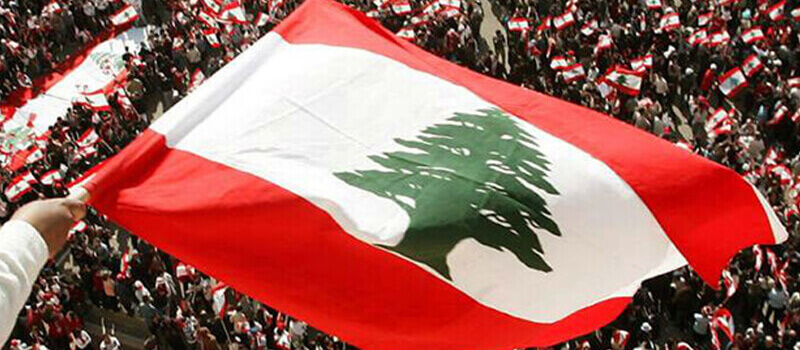FILE: The Lebanese Independence Day . This November 22 Lebanon army decided to skip its independence day celebration .There is nothing to celebrate. Like many failed states it is held hostage by a corrupt elite that allowed the country to sink . This is the year that the Lebanese port in Beirut exploded. The iran – backed Hezbollah militant group reportedly stored there for seven years 2550 tons of Ammonium nitrate for use by its ally the Syrian regime in its barrel bombs against Syrian civilians . Evidence implicates Hezbollah backed Lebanese officials in the August 4, 2020 explosion but Hezbollah fired the judges who were investigating the explosion to avoid accountability. NOV 22, 2020
Lebanon’s prime minister told AFP on Tuesday his country was ready to bolster the army’s presence in the country’s south if there is a ceasefire to end weeks of intense Israeli air strikes and ground incursions targeting Hezbollah.
Najib Mikati said the international community had engaged in “serious efforts” to impose a ceasefire, which he said the Iran-backed militant group had already accepted.
His comments come as war-torn Lebanon strives for an end to hostilities after Israel on September 23 launched an intense air campaign mainly targeting Hezbollah in Lebanon, nearly a year into regular cross-border fire over the Gaza war.
“Currently we have 4,500 soldiers in south Lebanon, and we wish to add to them between 7,000 and 11,000,” Mikati said.
He said his cash-strapped government would start by recruiting an additional 1,500 troops, and that as soon as any ceasefire is agreed they would move in soldiers from elsewhere in Lebanon.
“The Lebanese state is ready to impose its sovereignty over all of Lebanese territory,” he said, in a country where the powerful Hezbollah group holds sway, particularly over swathes of the south.
About two weeks ago, Israel said it had launched limited ground operations in neighbouring Lebanon, with Hezbollah regularly reporting clashes between its fighters and Israeli troops in Lebanese border villages.
“The information we have is that there are brief (Israeli) incursions” into south Lebanon, he added.
‘Tightened’ airport security
At least 1,315 people have been killed since Israel intensified its bombardment of Lebanon, according to an AFP tally of health ministry figures, though the real number is likely higher.
The Israeli strikes — concentrated mostly on the south and east of the country, as well as the heavily populated southern suburbs of Beirut — have forced 1.2 million from their homes.
Mikati said security had been tightened at the country’s only airport in Beirut, to remove any potential justification for an Israeli attack.
“The government is doing everything in its power to remove any pretexts from the Israelis’ hands,” he said.
He added that “tightened security has been in place for a week at the airport”, located near Hezbollah’s south Beirut stronghold that has experienced intense Israeli bombardment.
He said “everything is inspected” from passengers to goods, cargo and incoming aircraft.
At the end of September, the Israeli military said it would not allow Iran to transfer weapons to its ally Hezbollah through Beirut airport and warned that its warplanes were ready to intervene should any such transfers be detected.
The airport was previously targeted during Israel’s last war with Hezbollah in 2006.
Lebanese Transport Minister Ali Hamieh previously denied Israeli accusations that Hezbollah was using the airport and border crossings to smuggle weapons.
On Monday, Israeli Prime Minister Benjamin Netanyahu vowed “to mercilessly strike Hezbollah in all parts of Lebanon –- including Beirut” a day after the Iran-backed group’s deadliest strike on Israel since the start of the war in late September.
Ceasefire
Later on Tuesday, Hezbollah deputy chief Naim Qassem warned Israel that the only solution to the current war was a ceasefire, saying the Iran-backed group would not be defeated.
Mitaki said that “if a ceasefire is reached, there will be full cooperation between the Lebanese army and UN peacekeeping forces in the south in order to implement Resolution 1701”.
Adopted in 2006, the UN Security Council resolution led to a ceasefire in the Israel-Hezbollah war that year and said the Lebanese army and peacekeepers should be the only armed forces deployed in the country’s south.
The resolution also calls for Israel to withdraw troops from Lebanon.
His comments came as Israel faced severe criticism over injuries and damage sustained by the UN peacekeeping force, which has been deployed in Lebanon’s south since the first of Israel’s four major ground offensives against its neighbour in 1978.
He also said that there were “serious efforts” to name a new president. The country is reeling from war and five years of economic collapse and has not had a head of state for almost two years.
“Electing a president is of the utmost necessity presently.”
© 2024 AFP/ FRANCE24


Leave a Reply
You must be logged in to post a comment.